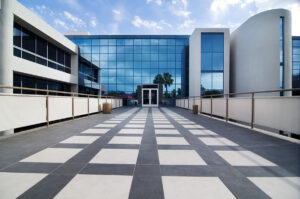
We believe in the importance of fire safety, so we have some summer fire safety tips for commercial facilities.
In commercial facilities where the mix of high temperatures, electrical equipment, and human activity can be a recipe for disaster, fire safety is critical. Ensuring fire safety in commercial environments is not just about compliance with regulations; it’s about protecting lives, property, and business continuity.
Regular Maintenance and Inspection
- Fire Protection Systems: Ensure that fire alarms, sprinklers, and extinguishers are in good working order. Regularly test alarm systems and conduct fire drills to ensure that all employees know the evacuation procedures.
- Electrical Systems: Summer heat can cause electrical systems to overheat, leading to potential fire hazards. Regularly inspect and maintain all electrical equipment, including wiring, circuit breakers, and outlets. Look for signs of wear and tear or overheating, such as discoloration or a burning smell.
- HVAC Systems: Heating, ventilation, and air conditioning (HVAC) systems should be inspected and serviced before the peak summer season. Ensure filters are clean and the system is functioning efficiently to prevent overheating and potential fires.
Safe Storage Practices
- Flammable and Combustible Materials: Store flammable materials such as chemicals, cleaning supplies, and combustible waste in designated, well-ventilated areas away from ignition sources. Use appropriate containers and ensure these materials are clearly labeled.
- Outdoor Storage: If you need to store materials outside, ensure they are kept away from direct sunlight and potential ignition sources. Use fire-resistant storage units and maintain a safe distance from the main building.
Proper Waste Disposal
- Regular Disposal: Dispose of waste regularly to prevent the accumulation of flammable materials. Ensure that dumpsters and trash bins are located away from the building and any heat sources.
- Recycling: Be mindful of how recyclable materials are stored and disposed of. Materials such as paper, cardboard, and plastics can easily catch fire. Ensure they are kept in designated recycling bins and regularly collected.
Managing Heat Sources
- Equipment: Be mindful of heat-generating equipment such as computers, machinery, and kitchen appliances. Ensure they are well-ventilated and not left unattended while in use.
- Smoking Areas: Designate specific smoking areas away from the building and provide appropriate receptacles for disposing of cigarettes. Ensure these areas are clearly marked and regularly monitored.
Landscaping and Vegetation Management
- Maintain Clear Zones: Keep the area around the facility clear of dry vegetation, debris, and other combustible materials. Create defensible space by maintaining a buffer zone of at least 30 feet around the building.
- Watering and Pruning: Regularly water and prune plants, trees, and shrubs to reduce the risk of fire. Remove dead branches and foliage that can act as fuel for fires.
Addressing Seasonal Risks
- Heatwaves: During periods of extreme heat, ensure that the building’s cooling systems are functioning optimally to prevent overheating of equipment. Consider implementing a cooling center within the facility to keep employees safe and comfortable.
- Barbecues and Outdoor Activities: If your facility hosts outdoor activities such as barbecues or events, ensure all cooking equipment is used safely and that a fire extinguisher is readily available. Never leave grills or open flames unattended.
Fire Safety Training
- Employee Training: Conduct regular fire safety training sessions for all employees. This includes training on the proper use of fire extinguishers, evacuation procedures, and how to respond in the event of a fire.
- Emergency Plans: Develop and regularly update your facility’s emergency response plan. Ensure that all employees are familiar with the plan and understand their roles during an emergency.
Regular Audits and Updates
- Fire Safety Audits: Conduct regular fire safety audits to identify potential hazards and areas for improvement. Use these audits to update your fire safety protocols and ensure compliance with the latest regulations.
- Stay Informed: Keep abreast of the latest fire safety standards and best practices. Participate in fire safety seminars and training programs to stay updated on new technologies and methods to enhance fire safety in your facility.
Fire Protection Services from Fireline
Whether you need smoke detectors, fire extinguishers, or an automatic sprinkler system installed at your commercial property, Fireline has you covered. We have been protecting people and property from fire damage since 1947—and our experience shows in our excellent work! We are known for our superb customer service, our expertise, and our reliability. For more information on how we can help your residential or commercial property, visit us online or give us a call at (800) 553-3405. We are in Baltimore, MD, with a second office in Leesburg, VA. For more fire safety tips, be sure to follow us on Facebook, Twitter, and LinkedIn.
